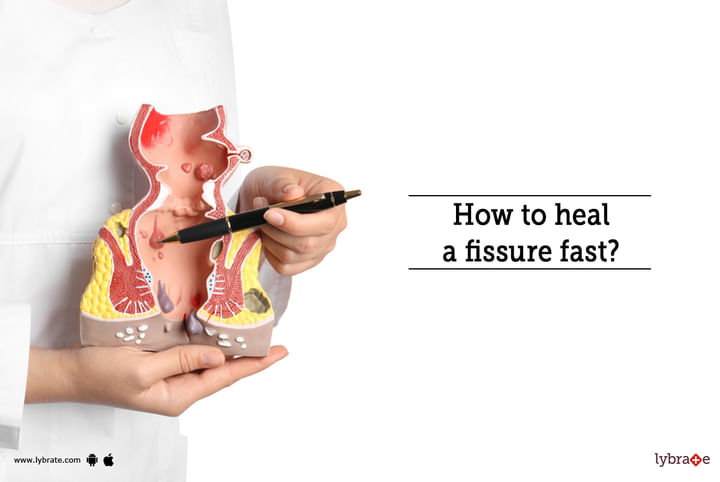Get the App
For Doctors
Login/Sign-up
Last Updated: Jan 06, 2025
BookMark
Report
How to heal a fissure fast?
What is Fissure?
Fissure is a term used to describe conditions that cause small cuts or tears in the lining of the anus. These tears can be caused by a variety of things, including straining during bowel movements, infections, and chronic constipation.
Types of fissure
- Radial fissure: This type of fissure is a crack that branches out from the centre of a surface like the spokes of a wheel.
- Linear fissure: This type of fissure is a crack that runs in one direction, often in an almost straight line.
- Circular fissure: This type of fissure is a crack that forms in a circle or ring around a specific point.
- Lateral fissure: This type of fissure is a crack that runs perpendicular to the main surface, often at an angle from one side to the other.
What are the signs and symptoms of Fissure?
- Pain: The most common symptom of a fissure is a sharp, stinging pain during and after bowel movements. This pain can last for several minutes or even a few hours.
- Bleeding: Following wiping, a vivid crimson blood streak could appear on the toilet paper or the faeces.
- Itching: Anal itching (pruritus ani) is often associated with anal fissures. It is caused by inflammation of the skin around the anus, which can be very uncomfortable and embarrassing.
- Skin tags: Anal skin tags (which look like extra bits of skin at the edge of the anus) may develop as a result of chronic fissures and can cause discomfort when wiping after going to the bathroom.
- Bowel incontinence: In rare cases, anal fissures can cause faecal incontinence, which is when you are unable to control your bowel movements and pass stool involuntarily.
What are possible complications of Fissure?
- Anal fissures can lead to chronic anal pain, itching, and swelling, which may interfere with daily activities.
- Fissures can cause severe pain when passing stools and the subsequent spasm of the muscles around the anus can make it difficult for the fissure to heal properly.
- The skin around the anus may become thickened and scarred, which can cause narrowing of the anal canal resulting in difficulty passing stools.
- In rare cases, an anal fistula or abscess may develop as a result of a fissure, which requires further medical intervention to resolve.
- If left untreated, an anal fissure can lead to faecal incontinence due to chronic inflammation and weakening of the sphincter muscles that control bowel movements.
How to heal a fissure fast?
- Increase Your Fibre Intake: One of the finest natural treatments for fissures is consuming more fibre. A diet rich in fibre can assist in softening your stool, making it simpler to pass and lessening the strain on your anus during bowel movements.Vegetables, fruits, nuts & seeds, whole grains, legumes, and beans are excellent sources of fibre.
- Drink Plenty of Fluids: Constipation can be avoided and regular bowel motions can be maintained by drinking enough of fluids. To stay hydrated and avoid having firm stools, try to drink 8 to 10 glasses of water each day.
- Apply Ice Packs or Cold Compresses: By freezing the area and lowering inflammation, using an ice pack or cold compress can also help ease discomfort brought on by fissures. Wrap an ice pack or cold compress in a towel before applying it directly to the skin for 10 minutes at a time several times per day as needed for relief.
- Drink a cup of water (normal water ) mixed with 1 tsp of honey and 1 tsp of ginger juice twice daily: Honey has anti-inflammatory properties which help reduce inflammation and pain. Ginger juice helps to improve digestion and can help heal fissures.
- Apply coconut oil on the affected area: This helps to reduce inflammation and keep the area moisturised.
- Apply aloe vera gel on the affected area: This aids in reducing itchiness and irritation.
- Take sitz baths with warm water: Sitz baths are a great way to reduce pain and inflammation. Soaking in a tub of warm water for 15 minutes 2-3 times a day can be beneficial for treating anal fissures.
- Use stool softeners: Stool softeners like mineral oil or docusate sodium are effective for treating constipation, which is one of the main causes of anal fissures.
- Use herbal remedies: Herbal remedies like turmeric, neem, amla powder, etc., are also effective for treating anal fissures as they contain anti-inflammatory properties that help reduce swelling and pain.
Surgery may be required if the aforementioned methods are unsuccessful.
What are the surgical treatments for Fissure?
- Lateral Internal Sphincterotomy: This is a procedure used to cut the sphincter muscle, which relaxes the muscle and relieves pressure on the fissure, allowing it to heal.
- Fissurectomy: During this procedure, a surgeon removes the fissure and surrounding tissue. This can help reduce pain and promote healing of the fissure.
- Advancement Flap Procedure: During this procedure, a surgeon creates a flap from healthy tissue near the fissure and attaches it over the affected area, supporting the fissure and promoting healing.
- Botox Injections: Botox injections are sometimes used to relax the sphincter muscle and reduce pressure on the affected area, allowing it to heal.
- Lateral Subcutaneous Internal Sphincterotomy (LSIS): During this procedure, a surgeon makes an incision in the sphincter muscle and removes a small portion of it to relieve pressure on the fissure, allowing it to heal.
- Laser Surgery: Laser surgery is another option for treating a chronic or recurrent anal fissure that has not responded to other treatments. A laser is used to cut away excess tissue or remove scar tissue that has built up around the fissure, relieving pressure on the area and promoting healing.
Best doctors to consult for Fissure?
- Colorectal Surgeon: A physician who focuses on the identification and management of illnesses and ailments that affect the colon, rectum, and anus is known as a colorectal surgeon. Colorectal surgeons have extensive experience in diagnosing and treating anal fissures, as well as other diseases of the gastrointestinal (GI) tract.
- Gastroenterologist: An expert in identifying and treating disorders of the digestive system, which includes the stomach, intestines, liver, gallbladder, and pancreas, is a physician known as a gastroenterologist. Fissures and associated diseases like Crohn's disease and ulcerative colitis are topics that gastroenterologists are quite educated about.
- General Practitioner: A general practitioner (GP) is a medical doctor who provides primary care for patients with a wide variety of health concerns. GPs are trained to diagnose and treat many common conditions, including anal fissures. They can also recommend lifestyle changes to help manage symptoms associated with anal fissures or refer you to a specialist if necessary.
In case you have a concern or query you can always consult a specialist & get answers to your questions!



+1.svg)
